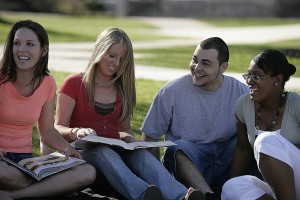 Castleton TRIO and first-generation students join international students for apple-picking this fall.
Castleton TRIO and first-generation students join international students for apple-picking this fall.
When Sarah Dunbar and Brooke Knudsen arrived at Castleton in Fall 2015, they had lots of questions about college life. Neither of their parents had attended college, and they weren’t sure how they would pay for their education. “Even understanding my financial aid package was a challenge,” Sarah admits.
And then there was homesickness. “Growing up, I was a shy person, always leaning on my family and friends,” says Brooke. “I wasn’t sure how I was going to make it through college being away from them.”
Both young women found the answers to their questions – and a home away from home – at Castleton’s Academic Support Center (ASC). Through the Summer Transition Program, they made friends like themselves, first-generation students with the same concerns about college life. Staff members helped them identify financial aid opportunities and encouraged them to pursue their dreams.
Today, those early uncertainties seem very far away. Both Sarah and Brooke have thrived academically at Castleton. Sarah, a multidisciplinary studies major who hopes to teach elementary school, has a 3.80 G.P.A. This summer, Brooke, a biology major, conducted research on the effects of glyphosate-based pesticides through Castleton’s McNair Scholars program. Both have mentored and tutored other students at the ASC. Despite her avowed shyness, Brooke recently served as the Mentor Coordinator for the TRIO Texting program, a program for incoming first-generation, low-income students. She attributes her newfound confidence to the ASC. “The ASC shaped who I am today,” she says. “I have grown as an individual.”
While Brooke and Sarah’s stories are inspiring, they are far from unusual: roughly half of Castleton’s students are first-generation. These students often face a plethora of obstacles from financial problems to unfamiliarity with academic jargon. For these reasons, they are more likely to become discouraged and drop out than their peers. “They have a sense of fragility, that coming to college does not necessarily mean finishing college or having the lifestyle of one’s dreams,” observes Rich Cark, Professor of Political Science at Castleton University.
Clark knows something about being a first-generation college student: neither of his parents went beyond high school, and they did not encourage their six children to further their education. “They tended to feel that those with higher levels of education were snobs who looked down on them,” he says.
Clark applies his own experiences to his work with Castleton students. He recalls meeting first-generation students during his interview. “I felt like I had found my people,” he says. “At my previous school, many of the students struck me as feeling a sense of entitlement about their lives and their position. I don’t get that with Castleton students, many of whom have a sense of triumph about being in the room, being on campus.”
Faculty and staff agree that first-generation students bring unique strengths and insights to their studies. “Typically, first-generation students are appreciative and work hard to prove they belong,” says Andy Vermiliyea, chair of the Natural Sciences department and a first-generation college graduate.
Gerry Volpe, Castleton’s Coordinator of Disability Services, concurs. “Many first-generation students have overcome obstacles many of their peers can only imagine and have come away with a strength of character that serves them quite well,” he says. “As a first-generation student myself, I am proud to support these students.”
Certainly, Brooke and Sarah are grateful for their education. “I know how hard I have worked to get here and how hard my family has worked to get me here,” says Sarah. “So I am doing my best to make the most of this opportunity.”
Brooke agrees wholeheartedly with her friend. “Persistence and heart are the true meaning of being a first-generation student,” she muses. “We do the best we can, and our heart is always in it because we wouldn’t be here if we didn’t truly want to be.”
– Dorothy A. Dahm

